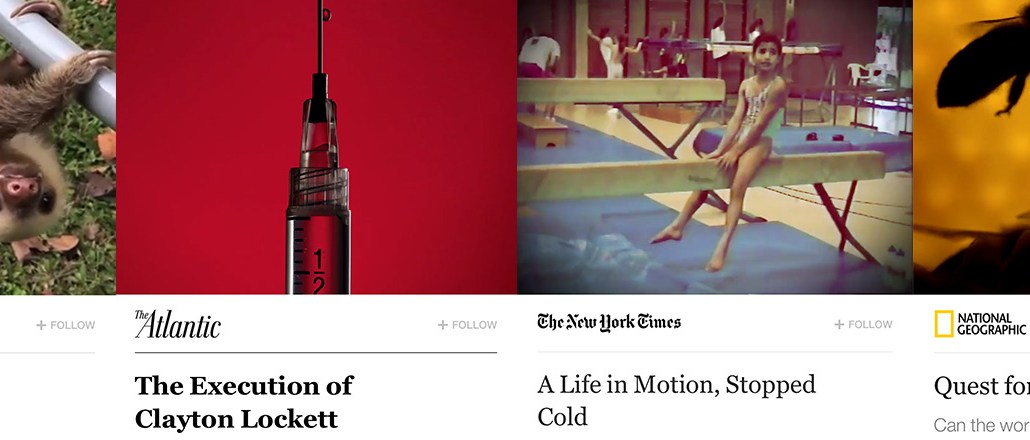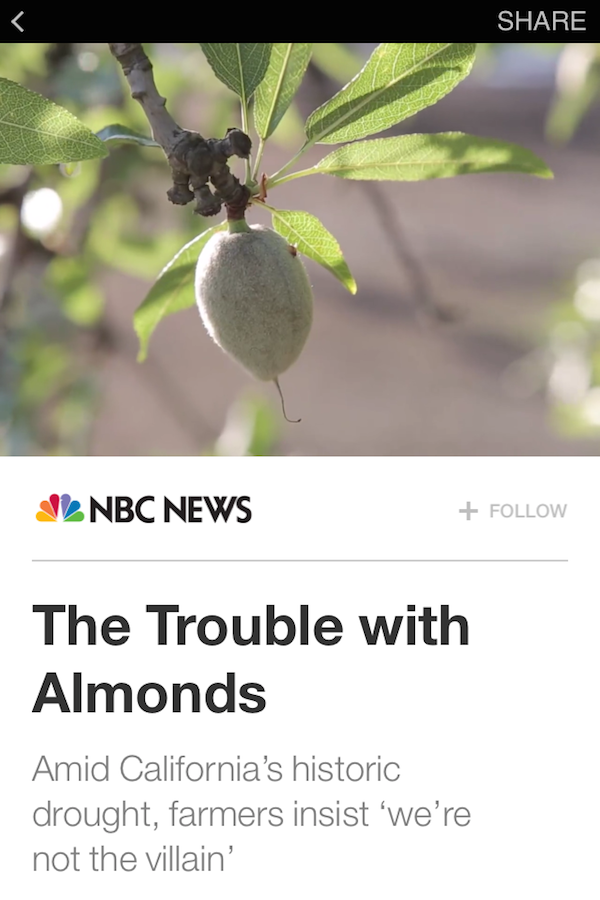
On Wednesday, nine major publishers began publishing articles straight to Facebook under the social network’s long-anticipated product, called Instant Articles. Facebook sweetened the deal by letting publishers control the ad sales, branding and content; sell ads on the articles and keep all the revenue; and get data on their readers.
Still, publishers were mixed in their embrace: BuzzFeed and NBC News were the only ones to go all in committing to using the product. Others, like The New York Times and the Atlantic, are taking a more cautious approach. There are still plenty of unknowns, chiefly whether Facebook’s terms will remain as generous to publishers as they seem to be now.
With that in mind, here’s a look at how some publishers approached Instant Articles on Day One:
The New York Times
What they said
The Times said it hoped to reach new and young readers this way to convert them to paying subscribers, which has been a challenge as digital-subs growth has tapered off. Said CEO Mark Thompson: “We have a long tradition of meeting readers where they are, and that means being available not just on our own sites but on the social platforms frequented by many current and potential Times users.”
The content
This was a multi-department effort by the Times, which used the format to publish a seven-part feature on a Brazilian gymnast preparing for the Olympics. The Times took advantage of Facebook’s autoplay video, big pull quotes and full-bleed images, but its length showed the learning curve publishers are on as they need to figure out how to tailor the content to the platform, said Jason Stein, CEO of Laundry Service. “They posted a 9,000-word story about a niche topic, and no one really read it,” he said.
Schedule
The Times, which is vehement about growing its paid subscription business model, didn’t commit to a regular publishing schedule, stressing that it was treating the feature as an experiment.
Advertising
The Times said it would sell all ads directly, as it did with its launch sponsor Shell, which is running in-stream ads promoting its #makethefuture campaign.
The Atlantic
What they said
“Our goals, as always, are to create a great user experience for our journalism, to find the largest possible audience for our stories, and to find revenue opportunities that allow us to continue to fund our work. The Facebook program helps us meet all these goals,” a rep said.
The content
The Atlantic also went the long route with the 6,500-word cover story “Cruel and Unusual: The Execution of Clayton Lockett.” It used an animated video as the lead image and zooming image mark-up. It took a team of three to create the project, but the Atlantic said that for pieces that don’t use Facebook’s special features, most of the work can be done via feeds from its CMS.
Schedule
Like the Times, the Atlantic didn’t commit to a publishing schedule, saying it would decide how much to publish in the coming weeks based on article performance.
Advertising
The publisher directly sold an ad in the article, to Seagate, but its standard format suggested a missed opportunity to take advantage of Day One of the product’s launch with a more elaborate ad or native treatment.
BuzzFeed
What they said
“As our experience with BuzzFeed Motion Pictures has taught us, there is a massive opportunity here: for editorial, for video, and for sponsored content,” the company said.
The content
Perhaps more than any other publisher, BuzzFeed embraced Instant Stories, which isn’t surprising, given the product fits its distribution model. Its launch post, “13 Steps to Instantly Improve Your Day,” is pure BuzzFeed. It’s designed for a quick read on mobile and uses automatically loading GIFs and embedded native video. “It doesn’t matter if you’re not going to BuzzFeed’s site — you won’t mistake it for any other media outlet,” said Victor Piniero, vp of social media at Big Spaceship, a digital agency.
Schedule
BuzzFeed plans to publish all its articles to Facebook natively.
Advertising
Facebook is allowing publishers to upload its native ads to Instant Articles, so BuzzFeed went the extra mile in creating a sponsored post for “Pitch Perfect 2.” The ad links out to the mobile Web rather than staying in Instant Articles, but BuzzFeed hinted that would change.
National Geographic
What they said
“Reach is very important for us,” said Declan Moore, chief media officer. “We do that via our storytelling. At some point in time, there’s an economic imperative; the amount of traffic on our site that’s sourced to social is growing. We’re looking to sign up new members, we’ll sell advertising, and calibrate what it does.”
The content
Nat Geo posted a 2,600-word article, “Quest for a Superbee,” that was complemented by autoplay video, audio commentary, full-bleed images and mapping features. Moore said this article was chosen for its breadth of media assets and that it took a fair amount of effort, but that wouldn’t necessarily be the case for all future Instant Articles. “We’ll be looking for a way to streamline. You just can’t start publishing for individual platforms because it can’t scale.”
Schedule
Nat Geo is looking to publish three features per week from its portfolio.
Advertising
Nat Geo is a nonprofit and relies in part on memberships for revenue, so it used its first Instant Article to encourage new sign-ups with a house ad. It expects to sell ads in the future.
NBC News
What they said
“We value our audience wherever and however they find us. Offering a seamless experience for NBC News’ growing audience on Facebook, through faster load times and new inroads for engagement, and ensuring credit for that traffic and new monetization opportunities, is a win-win,” a rep said.
The content
The network posted a 1,300-word article, “The Trouble with Almonds,” that also used Facebook’s autoplay video, maps and swipeable gallery. Video and images were shot and edited with this format in mind, and media was created specific to the format. For example, correspondent Hallie Jackson shot a selfie video on her iPhone inviting questions from readers so she could respond within the article itself.
Schedule
The plan is to post an average of 25 stories a day.
Advertising
There were no ads in the launch article, just a promo for NBC.
Image courtesy of Facebook.
More in Media

In Graphic Detail: The scale of the challenge facing publishers, politicians eager to damage Google’s adland dominance
Last year was a blowout ad revenue year for Google, despite challenges from several quarters.

Why Walmart is basically a tech company now
The retail giant joined the Nasdaq exchange, also home to technology companies like Amazon, in December.

The Athletic invests in live blogs, video to insulate sports coverage from AI scraping
As the Super Bowl and Winter Olympics collide, The Athletic is leaning into live blogs and video to keeps fans locked in, and AI bots at bay.










